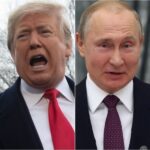
More than a week into the Russian invasion of Ukraine, Russian President Vladimir Putin has escalated his military offensive. Ukrainian President Volodymyr Zelenskyy has rallied international support for a major resistance. And major Western powers have isolated Russia by imposing devastating economic sanctions that leave Putin without an obvious off-ramp.
There is no end in sight to the war on the ground.
But there’s another war being fought in parallel through news interviews, social media posts and open source data: the information war. And it’s happening well beyond Ukraine’s borders.
Today, Playbook author Ryan Lizza talks with CNN senior international correspondent Matthew Chance, who’s on the ground in Ukraine, and former White House national security adviser Tom Donilon about the relationship between warzone dispatches and Washington policy. Transcribed excerpts from that conversation are below, edited for length and readability.
On the effect that news is having on response to the war in Ukraine:
Ryan Lizza: I feel like you’ve become the face of this conflict, or at least one of the faces. And in Washington, politicians are pretty unified about absolutely no troops going into Ukraine, no no-fly zone, right? Everyone is scared that that would lead to World War III. But I don’t think we’ve seen yet what might be coming in the next days and weeks as the Russians eventually, inevitably break through some of these cities. The images that you and your colleagues will be broadcasting throughout the world, one can guess might be pretty ghastly. I wonder if you think about the sort of effect that you can have on the international community’s response to what’s going on in Ukraine? There’s a long history, especially at CNN, of bringing these conflicts into people’s living rooms and changing the way the policymakers think about the options they have before them. Is that something you’ve thought about?
Matthew Chance: I do think about it. Yes. But, you know, you’ve got to be careful what you wish for, particularly with Russia. You can stand up there on your high horse all you like and say, “We should be putting boots on the ground. We should be imposing a no-fly zone over this country to stop the civilian deaths.” But that action is going to provoke a reaction from Russia. Russia has more nuclear weapons than any other country in the world. I grew up in the Cold War. I remember as a kid crying myself to sleep, thinking that I wasn’t going to make it to adulthood. The mutual assured destruction idea that if we get into a confrontation that could escalate was something that is really a deep-seated fear in people of my age.
And so I do understand the calls for a no-fly zone here. I do understand the debate about whether there should be boots on the ground and whether NATO countries should join in or whether Ukraine should be quickly embraced into the community of the Western military alliance. I’m not sure that I would advocate for that. You know, in the end, you can’t predict, can you, what Putin might do. There are all sorts of rumors about the Russian military doctrine allowing them to use tactical battlefield nuclear weapons. Again, a week ago, I would have been like, “Putin is a rational actor.” Is that now true? Or are we talking about somebody who’s been isolated for the past two years during this COVID pandemic and has been getting advice from a very limited circle of advisors, with no one really telling him the reality of the situation? I don’t know.
On Putin’s behavior and going forward:
Lizza: What’s the thing that you worry about the most as this crisis goes forward and especially as we start to see, as you pointed out at the top of this, the Russian military, which has been frustrated with how things are going, making this look a lot more like Grozny every day?
Tom Donilon: I mean, the first concern obviously is that Putin in terms of his decision-making is a very isolated leader. I even saw in my dealing with him during the Obama administration increasing isolation and an increasing dismissal of his aides. Kind of reacting pretty brutally towards his aides, even in front of foreigners, right? And he had been kind of moving in that direct and towards kind of an isolated Tsar-like existence that he leads in Russia. I think that’s become exacerbated during the course of COVID where the advisors that he’s talking to are small in number and all come basically the same kind of KGB, FSB kind of background that will reinforce a lot of the grievance and paranoia that he has. I also think you’re in a situation where it doesn’t really — in those circumstances, it doesn’t pay to be the truth teller. I don’t think he really regards any of his advisors as having anywhere near the strategic sense that he has.
And so, you know, worry number one is that he could undertake a set of steps here which could be quite escalatory. And he’s already made a number of mistakes here in terms of underestimating the resistance that he was going to run into in Ukraine; underestimating the kind of sanctions that could come down. So he’s made a number of errors here. And so you worry, someone who was that isolated, operates the way that he operates. Ryan, there’s no real system around Putin.
Lizza: The process that you ran at the NSC [National Security Council], that doesn’t exist.
Donilon: No. No. And we saw that, right, on television in that so-called “National Security Council meeting” that Putin had before the invasion was launched. Where he had the National Security Council not in the situation room, sitting around the table, advising the president, but sitting like schoolchildren in a big hall at the Kremlin and him calling them up one by one to give their lessons to him and correct them as they went along.
Lizza: I find the stuff that’s come from advisors to [French President Emmanuel] Macron fascinating. He’s the one that’s had the most dealings with Putin throughout this in the West. And if you’ve read some of the coverage in the French press or American reporters that have access to the French leadership, he has been apparently, reportedly telling people that, like you said, over the course of COVID, Putin became more paranoid, more isolated. And that in his conversations with him, he found him less rational, more ranting, more about Ukraine. And that he did some kind of almost psychological change in him over the last year. Is that what you hear from your network that understands him?
Donilon: It doesn’t surprise me actually, given the dynamics that we’ve had, right? It doesn’t surprise me during COVID. But also, as I said earlier, Ryan, you could see this happening. The system kind of deteriorated around him particularly when he came back. When he came back into office for the second time in 2012, you know, my encounters with him where he was increasingly imperial. dismissive of his assistants and actually kind of humiliating them in front of foreigners. But along the lines of that scene we saw at the so-called “National Security Council meeting,” he humiliated on the world stage his director of foreign intelligence. Now, we also know from analysis of different — if you talk about private-sector analysis, there’s been some analysis of looking at the watches that [Foreign Minister of Russia Sergey] Lavrov and others have on. But in fact, that event was pre-recorded before it was released to the world. That event took place before they released it, it looks like. I’m not big on making these observations off of any analysis other than my own kind of following reports. And so that was a decision made, right? They could have edited that.
Lizza: Right. It wasn’t live.
Donilon: No, it wasn’t live.
Lizza: Why would he want to show him being questioned and dressing them down?
Donilon: I think because it shows a dominance and he’s the tsar. Nobody else can kind of offer anything to him. And he obviously is a person steeped in these historical grievances. So you worry about Putin’s decision-making and the decisions that he might make. He also, by the way, I think has been surprised by the ability of President Biden and the United States administration to unify their response. I think Putin’s expectation is based on history — we talked about Crimea — based on the 2014 history, based on the 2008 history, right? I think that Putin would have expected a more fractured and long-term, difficult-to-manage response because that’s what happened before.
On how the Ukrainians are holding onto Kyiv:
Lizza: From what you’re understanding, what has been the secret to keeping the Russians out of Kyiv so far?
Chance: I think there’s two factors. First of all, I think the tactics used by the Russians were underpowered. If they thought that they were going to fly in special forces to seize an airport and then bring in troops and tanks, et cetera by air into — with an airhead or an air corridor they’d secured, and then sort of march into the city — which I think was the plan because that’s what they tried to do — that didn’t work. There was very — and this is the second factor. It’s the resistance that they’ve underestimated, as well. I think Putin probably thought, and he said this, that he wanted people to surrender. He expected the Ukrainian military to capitulate and to overthrow the government. But that’s not happened at all.
I mean, I spoke to the civilian defense forces. I did a little story with them, as well. They were saying to me, “Look, the day before the invasion, if you’d have asked us then, we’d never have joined a sort of militia and picked up a gun and thought of fighting and dying for our city or our country or our neighborhood.” But as soon as those tanks rolled in, as soon as Russian forces started coming in, I mean, that flicked a switch in a lot of people’s minds. And so you’ve got the Ukrainian military, who are battle hardened because they’ve been fighting the Russians for eight years over in the east of the country, and then you’ve got like every adult male who’s been given a gun. They’ve issued something like 25,000 Kalashnikovs to the population. And then behind that you’ve got old women in apartment blocks making Molotov cocktails and delivering them to those people.
Lizza: Have you seen anyone use one of those yet? Have they actually been part of the fighting?
Chance: Well, I’ve seen them in social media videos being used. But I’ve seen the actual Molotov cocktails being delivered to the civil defense forces, as they’re calling themselves. Territorial Defense, they call themselves. But I’m not sure that is enough to change the outcome of a concerted Russian effort with the full strength of Russian Armed Forces and one of the world’s most powerful air forces, remember, to take this city and to take this country.




